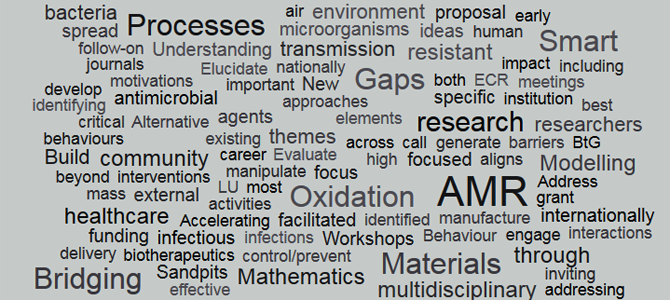About us

Antimicrobial Resistance (AMR) occurs when microbes (harmful bacteria) develop a defence against the drugs (antibiotics) which are designed to kill them.
The majority of the world’s pathogenic bacteria have now developed some level of resistance to antibiotics used to treat them; medical professionals therefore are at the stage of using last resort drugs. Integrated intervention approaches including developing new treatments, targeted drug delivery, rapid diagnostics, environmental decontamination strategies combined with better understanding of the human and social dimensions of the AMR problem are desperately needed.
With £545,000 funding from EPSRC, Loughborough’s cross-disciplinary AMR network brings together experts from chemical engineering, sport and health sciences, chemistry, maths, and mechanical and manufacturing engineering.
The focus of our network will be to improve the understanding of AMR across the University and beyond, and to identify opportunities and facilitate interdisciplinary research projects (e.g. through pump priming funding) to help tackle this global health threat. Specifically, the Loughborough network will try to understand and explore mitigation strategies that relate to how the environment and human behaviour in community and healthcare settings enables the spread of resistance genes and the acquisition and transmission of antimicrobial resistant infectious agents.
Scientists will interact with clinical and industry partners facilitated through hosting of a series of workshops, lectures and networking events to share knowledge and bring together experts to address the AMR challenge.
The ‘Tackling Antimicrobial Resistance – An Interdisciplinary Approach’ project team are keen to engage with colleagues to ‘Bridge the Gaps’:
- Build a strong community (critical mass) of multidisciplinary researchers focused on AMR research themes.
- Address specific barriers to undertaking multidisciplinary research in AMR through specific focused activities.
- Use meetings, workshops and sandpits to generate new ideas for AMR research, and build multidisciplinary research teams to develop the ‘best ideas’ facilitated through pump-priming funding.
- Build external relationships both nationally and internationally by inviting internationally recognised AMR researchers to Loughborough facilitated through a seminar series.
- To engage early career researchers (ECR) including a focus on their personal development as scientists.
Please contact us to discuss how we may be able to work together.
